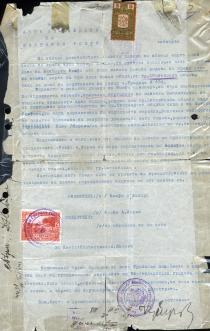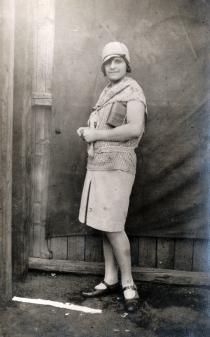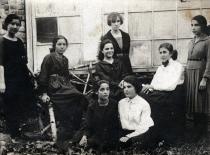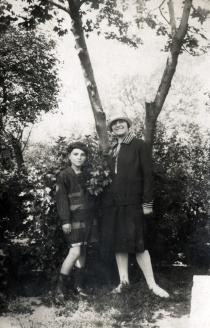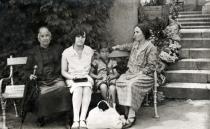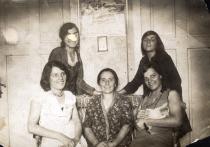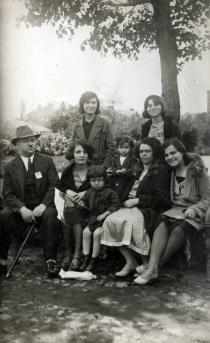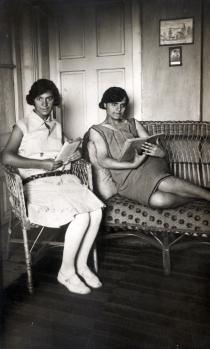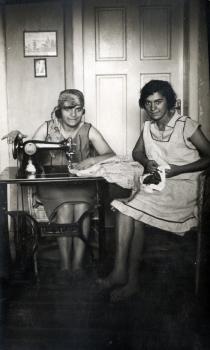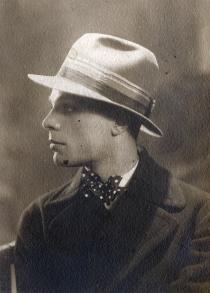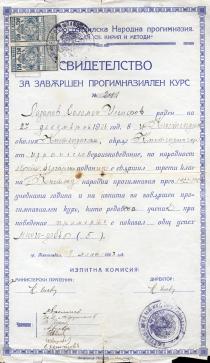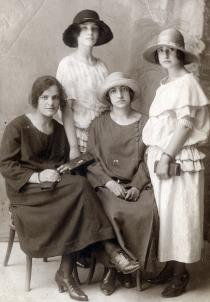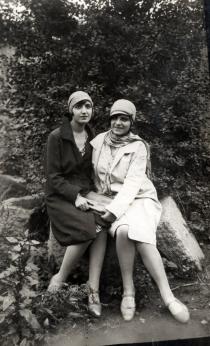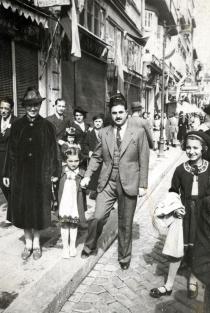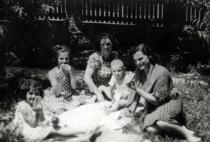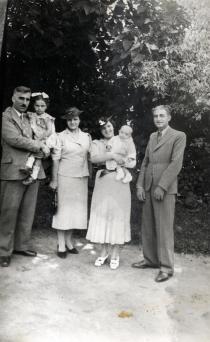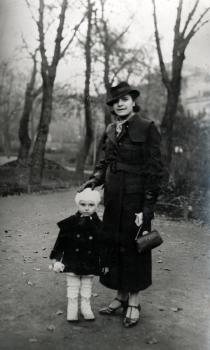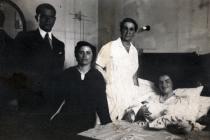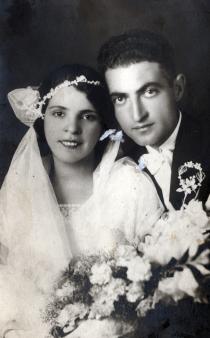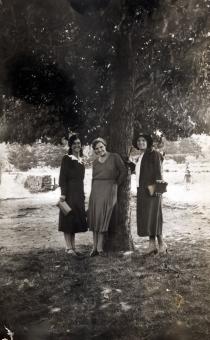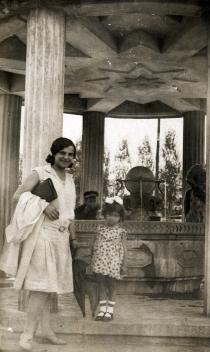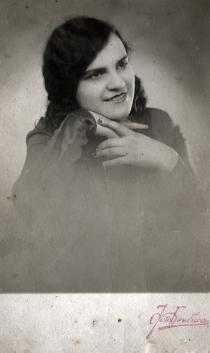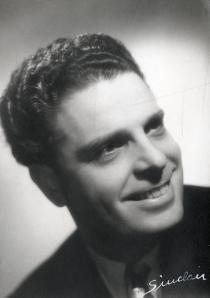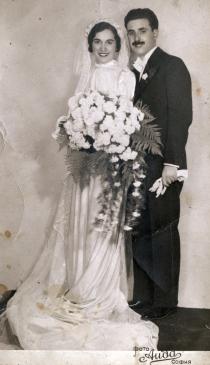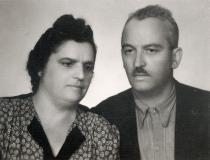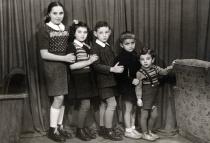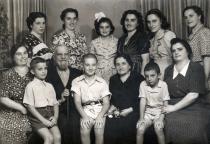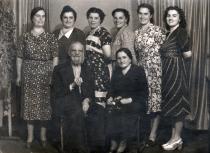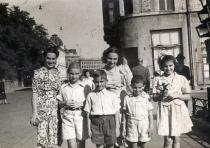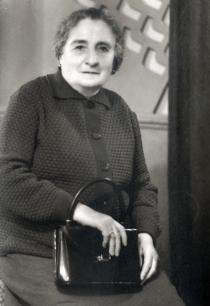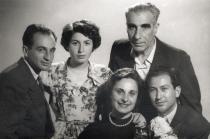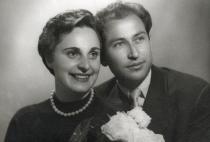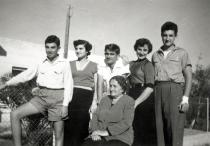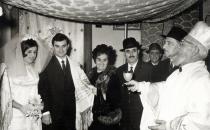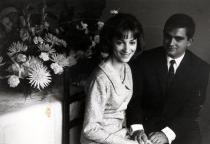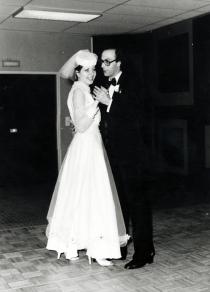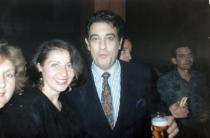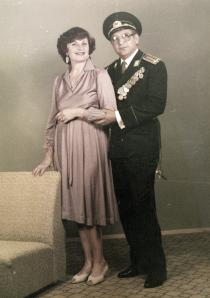
Anelia Kasabova
Sofia
Bulgaria
Interviewer: Dimitar Bozhilov
Date of interview: March 2002
Family background
Growing up
During the War
After the War
Glossary
My maternal ancestors came from Spain five centuries ago after Queen Elizabeth had ordered the expulsion of the Jews from Spain 1. The language and the typical Sephardi cuisine originate from that country. My maternal grandmother, Ester Elazar, nee Beraha, was born in the town of Nish in today's Serbia in 1879. She had a big family there and she kept in touch with them until World War II. Unfortunately all her relatives were deported and killed in the death camps. She was really lucky that she went to the town of Kiustendil when she was 16. She got married to my grandfather, Josef Elazar, who was born there. They had six daughters and a son.
My grandfather was born in the village of Sovoleno near Kiustendil in 1875 and he traded with chick-peas. I've heard stories that the courtyard of his house was filled with sacks of chick-peas that my grandfather sold. My mother told me that once she stumbled over those sacks and twisted her knee badly. She recalled that a popular healer fixed the knee with just one touch. My grandparents' family lived quite poorly. They had seven children - six daughters and a son, who went to France when he was only 19 years old and never returned to Bulgaria. My grandfather was the only one who provided for their living. My grandmother was a housewife. Later on my grandfather became a chazzan at the synagogue in Kiustendil until the whole family moved to Sofia. All my relatives from Kiustendil went to Israel after 1948. My grandfather was religious, but he wore civil clothes. He had many books in Hebrew, and he also had the Talmud and read prayers all the time.
In my mother's baptismal certificate it is written that she was born on 654, Gradetz Street in March 1906. My mother's parents rented a house there. Not many people had their own houses at that time. The house where my mother was born was somewhere near Hisarlaka [a hill in the central part of the town]. I don't know exactly where the house was situated because my mother's whole family moved to Sofia at the beginning of the 1920s. All her sisters and her brother were very young and most of them started working as shop assistants. They lived on Pirotska Street when they came to Sofia and afterwards they moved into a house on Otetz Paisii Street in the Jewish neighborhood of Iuchbunar 2. There were many textile merchants and my mother and her sisters managed to start working in their shops. One of my aunts, my mother's sister Zelma Avramova, nee Elazar, married a textile merchant and went back to live in Kiustendil - their house was in the center of town. I remember that when I was a little child my mother used to take me to Kiustendil every summer to visit my aunt.
I was born in Maichin dom hospital in Sofia in 1933. My mother was the only one of the sisters in the family that got married to a Bulgarian, my father Jordan Todorov Angelov. The fact that she didn't marry a Jew wasn't a problem for the family. They separated very soon after I was born, at the beginning of the 1930s - I don't know why. I respected my father very much. He was left-wing. He was born in Svishtov and he used to organize the military actions of the resistance movement in Svishtov and that's why he was sentenced to 20 years of penal servitude in the town of Veliko Turnovo. My father had troubles with the authorities all the time, before and during World War II, because of his left-wing convictions and his anti-fascist activities. Inevitably, that influenced his relationship with my mother. My father was a communist and he was well-known in Svishtov district as the organizer of military actions against the pro-German policy of Bulgaria during World War II. [see Bulgarian legions] 3
In 1932 my father was sentenced to twelve years of penal servitude in the town of Veliko Turnovo. He was released under an amnesty before 9th September 1944 4. He had a bad record and couldn't find work anywhere. He was requited after 9th September 1944 and he became an active fighter against fascism and capitalism. I kept in touch with my father all the time.
I grew up on Otez Paisii Street in Sofia where my mother, my grandmother and my grandfather used to live. My grandma was a housewife and my grandfather started work at the Great Synagogue 5 in Sofia. It was his duty to perform the funeral services there. He was the one to organize the whole funeral ritual.
My uncle Solomon Elazar, my mother's brother, went to France after the family had moved to Sofia. He started working with some firm in Sofia first. His boss highly valued his work and took my uncle to France with him when he was just 19 years old to work in a sock factory, Chesterfield. He made a fortune there and started to support the whole family. He supported my grandparents all his life, even after they went to live in Israel. Uncle Solomon never returned to Bulgaria. Maybe because he was aware of the fact that he hadn't served in the Bulgarian army.
My uncle had a very interesting period while he was in France. He used to hide for a few months in the basement of his boss's daughter who was in love with him. He was literally walled up there so that he couldn't be found. There was just a small opening through which he received his food. That's how he survived during the German occupation of France during World War II. My uncle didn't marry his boss' daughter; he married a Bulgarian Jew. He was a very noble man and, as I said before, he supported his relatives in both Bulgaria and Israel.
My mother's oldest sister was named Buka - it is a tradition for the oldest daughter to be named Buka; after that came Sofi, Zelma, my mother Victoria, Lunna and the youngest sister, Paola. My youngest aunt died when she was 92 - in an old people's home in Israel. All my mother's sisters got married in Sofia without having any dowry because they were all very poor. After they moved to Sofia they all found jobs and contributed to the family's income. My mother wanted to have some qualification, attended a typing course and started work as a typist. She met my father at this course. They all lived in the house on Pirotska Street then. We didn't all live together on Otez Paisii Street anymore because some of my aunts had already got married. Only my mother, my grandparents and I lived in that house which was in an inner courtyard. All my aunts lived with their families.
My maternal grandfather always wore a long beard. He knew a lot of proverbs in Ladino. For example: 'Kuando muncho eskoresi, es paramaniser' [When it gets much darker - that is because it will get lighter after that]. And another one: 'Kalavasa, donde pasa, no emberasa' [The pumpkin doesn't leave any trace from where it passes]. He kept saying that proverb in Bulgarian also: 'When you do good - hide it under a rock'. We only spoke Ladino at home. Although my grandfather was a chazzan most of my relatives weren't very religious.
The house on Otez Paisii Street was very humble. There were two rooms and a dark corridor. I don't remember if we used a gas lamp or a plate at that time as there was electricity in the house. We had a wood-burning stove for heating and my mother and grandmother used to cook on it as well. My mother was very hospitable and the house always smelled of coffee. I wanted to try it very much but my mother's friends told me that my teeth would get black.
I was a very naughty child and I kept on running along the tramlines on Pirotska Street. I remember that once the tram had to stop because I was standing on the lines. The tram-driver got off, pulled my ear and made me take him to the place where I lived. When I took him to my home, he scolded my mother and grandmother for not keeping an eye on me.
My family wasn't very religious but we observed all the Jewish holidays and the kashrut. Fruitas 6 - the holiday of fruit and trees was a very jolly one. Then my mother used to prepare special bags full of fruit for all the children. It was a good deed to plant a tree then. I remember that my grandmother used to prepare special small flat loaves for Pesach. My grandfather Josef used to read the prayer in ancient Hebrew. Masapan [marzipan] was a typical holiday dish for the Sephardi Jews. It is made of almonds only. First you have to boil the almonds, then grind them and mix them with sugar. It's served on special occasions only such as weddings or a bar mitzvah. I saw masapan sold in boxes in Spain when I went to visit my daughter who lives there. I found many common things between us and the Spanish people. Spain is the second country after Israel that accepts Sephardi Jews and gives them citizenship. That's how my daughter - who is a violin player - came to go to Spain. She got a citizenship there. She has played at a concert of Placido Domingo.
Our family observed Sabbath. The preparations for the holiday started on Thursday when we prepared the pastry and cleaned the house thoroughly. That is the day when we had to buy meat and other products from a kosher shop. We used to buy a live chicken and take it to the synagogue where the shochet had to slaughter it. We prepared many different dishes then.
My grandmother was a very elegant woman and she had special clothes that she used to wear only on that holiday. Usually only men attended the Nochi di Shabbath - the night prayer for Sabbath - at the synagogue. They used to wear dark suits, white shirts, tallit and kippot that were made of textile or hand-knitted. Women used to wear high neck dresses with long sleeves and shawls over their heads. The candles were lit on that occasion - one for Sabbath and another one to remember that holiday. At the Saturday morning prayers Jewish women had the opportunity to feel as real ladies and show off their hats, their patent leather bags and their dresses.
Since I grew up without a father and was also the first-born granddaughter in the family, I always had the feeling that I had six mothers. All my aunts loved me very much and I used to spend a few weeks in each of their homes. My aunt Mara, as we called Lunna, lived on Bratia Miladinovi Street with my uncle Anriko and before my cousin was born I used to live with them for a few weeks. I also visited my mother's other sisters; we used to visit my aunt Zelma every summer - as I said before, she married a textile merchant and went back to live in Kiustendil.
In the years before the Holocaust we lived in the house on Otez Paisii Street with my grandparents. My mother's brother Solomon had settled in France and her sisters lived with their husbands. Aunt Zelma moved to Kiustendil and the rest of my aunts lived in Sofia. Aunt Paola and her husband Solomon lived on Hristo Botev Boulevard, Aunt Buka lived with her second husband Buko Nisim, Aunt Mara with her husband Anriko and Aunt Sofi with her husband Haim.
Our neighbours in Sofia were mostly Jewish. The neighbourhood where we lived was named Iuchbunar and was mostly inhabited by Jews. There was a Jewish family living next door and they were our relatives. I used to play with their children in the yard.
I went to the kindergarten on Denkoglu Street and after that I went to the Bulgarian 'Patriarch Evtimii' elementary school. I studied for a year at that school and I remember that they gave us the 1st grade certificates quickly as we had to be interned to the town of Berkovitza then.
The whole family was under great stress during the Holocaust. Many people had to either sell their belongings dirt cheap or just give them away. Anyway I appreciate the tolerant attitude of the Bulgarians during these hard days. It is indisputable that Bulgaria was the only country where the Jews were saved and weren't sent to concentration camps. [Editor's note: The interviewee is mistaken here, there were in fact other countries that saved Jews during WWII] The issue of the salvation of Bulgarian Jews is a difficult one and has been widely discussed, but the most important thing is that we were saved. On the other hand many Jews from territories occupied by the Bulgarian army in Serbia - then under supreme German command - were deported and died in the death camps. I remember the trains with Serbian Jews that were passing through Bulgarian territory during their deportation.
We were interned to the town of Berkovitza in 1943. We were settled in a school there and we used to get food from a common canteen. After that we went to a house which had no electricity. We used gas lamps. I rented a very poor place and we went to the school to get food from the common canteen. I recall that my grandfather kept reading prayers all the time. My mother and I were interned along with my grandmother, my grandfather, my aunt Mara, and her child. The atmosphere was very oppressive.
My aunt Paola and her husband Solomon were interned to Razgrad and my aunt Zelma to Kiustendil. She and my uncle, Mois Avramov, loved each other very much. The deportation trains that left for the death camps were ready then in Kiustendil. Aunt Zelma and Uncle Mois witnessed the threat of being sent to a concentration camp from firsthand experience. Aunt Sofi married a butcher who worked at Halite [a big shop in the centre of Sofia]. Halite was an enormous butcher's shop at the time. After they emigrated to Israel, my aunt Sofi's husband Haim went on dealing with retail trade but they didn't fix themselves up very well. My aunt Buka married when she still lived in Kiustendil. A brass band played at her wedding - the celebration was very colorful and original. She was widowed later and later again got married a second time. During the Holocaust she was interned to Ruse.
My uncle Anriko, Aunt Mara's husband, was a forced laborer at that time. Jewish men were sent to labor camps back then [see Forced labor camps in Bulgaria] 7. Uncle Anriko was a military officer - a captain in Barcelona during World War I. After that he worked as a bank clerk. Years later, when he had settled in Israel, he learned Hebrew perfectly and started working as a bank director. I suppose that Uncle Haim, Aunt Sofi's husband had also been in a labor camp.
Jews in Sofia had various professions at the time. Uncle Anriko was a textile merchant, Uncle Haim was a butcher and Uncle Moni was a clerk. There were also many doctors and merchants among the Jews. The poorer Jewish girls like my aunts worked as salesgirls and the rich ones just didn't go to work. Our neighborhood, Iuchbunar, was the place where poor Jews used to live, mostly on Stamboliiski Boulevard and Pirotska Street and those were some of the most colorful places in Sofia. The streets were always lively and certain typical things like Jewish baked eggs, chick-peas and so on were sold there.
After we came back to Sofia from our internment we settled in a house on 22, 20th April Street. In fact that was the house where Aunt Mara and her family had lived before the internment. We took the decision to live with her family. My grandparents had already arrived in Sofia and lived in another house on Otez Paisii Street. I remember that when my cousin - Aunt Mara's son, who is a lawyer in Israel - came to Bulgaria with his wife and one of their three sons, we took them to the house where he was born.
Bulgarians have always been very tolerant towards Jews. There were some anti-Semitic incidents and there are still some now, unfortunately. There were certain occasions when I was a child when people called me 'chifutka' and I felt very sorry about that and I couldn't understand why this was happening to me. We had very good relations with our neighbors in Berkovitza during the internment. They even wanted to help us and had compassion on us. We didn't feel anti-Semitism then.
My relatives started to leave one by one after the formation of Israel. Most of my aunts left in 1949-1950. My mother and I were the last to leave in 1953. I was studying at the language school in Lovech then. The language school was founded in the place of the American college after 9th September 1944. I went to Lovech when I was twelve and I studied there for four years. I had studied at the French College 8 on Lavele Street in Sofia for four years before that - there was a special class in which we studied French. I had studied in the secondary school on Shipka Street and continued to study French at the language school. My mother was preparing the documents for our departure to Israel at that time.
My grandparents went to Israel and my mother and I remained here. So we already had information about the place where we would go, and there were also people there to welcome and help us. My father remained in Bulgaria as he and my mother were already divorced.
We left for Israel from Italy in 1953. We crossed the whole of Yugoslavia and arrived in Naples where we had to stay for ten days before we got onboard a big ship called Jerusalem along with a group of other Bulgarian Jews who were also leaving for Israel. There was a constant stream of people leaving for Israel after 1948 [see Mass Aliyah] 9. We departed from Naples and arrived in Haifa. Our relatives who had settled in Tel Aviv were waiting for us there. The first years in Israel had been very hard for them, as they had lived in barracks but gradually, with the help of my uncle Solomon who lived in France, each of my aunts managed to build a small house in Tel Barukh. These houses existed until recently but then Tel Baruh was turned into a modern quarter of Tel Aviv and they built new buildings there instead.
When we went to Israel my grandfather had already died in the barracks near Haifa. He got severely ill because the climate there wasn't good for him. He had a foreboding that he would be a burden to his family. He stopped eating intentionally and he withered bit by bit. We settled in a house in Tel Baruh with my grandmother and the family of my aunt Mara with whom we had been together during the internment in Berkovitza and afterwards in Sofia.
My relatives immediately sent me to Jerusalem to study Hebrew at the Institute for Hebrew Studies. That was a very famous language institute and I stayed there for a year with board and lodging. Only immigrants with higher education such as doctors and engineers who were determined to study the language used to go there. My grandfather was the only one in the family who knew Hebrew before we went to Israel. I used to talk in Ladino with my grandma who knew almost no Bulgarian. I myself hadn't gone to a Jewish school in Bulgaria, and I had to learn Hebrew quickly - that was very important for a young person in Israel.
I was making my living with the support of my aunts and my uncle Solomon, who paid my monthly allowance. My mother didn't work in the beginning but afterwards she started to work in a factory where they colored shoulder straps. I had also worked there for a while before I went to Jerusalem to study Hebrew. I only have a vague memory of the smell of paint.
I had to join the army after graduating from the language institute. That's why I enrolled in a nurse school in Jerusalem, where I studied for two years. I was in touch with my future husband, Liubomir Kasabov, and I had already made up my mind to go back to Bulgaria. A friend of mine had introduced me to my future husband at the time when I was studying at the language school in Lovech, before I went to Israel. At that time he was studying in the Higher Military School for Construction Officers in Sofia.
I came back to Bulgaria alone, in 1956, to marry and live with my husband. There wasn't any good transport to Bulgaria then - neither airplanes nor regular ships - and I traveled by a small Bulgarian ship from Haifa to Burgas [a port town in Bulgaria]. I knew the captain, who lived in Varna, and I often met him in the town afterwards. He kept reminding me of that small ship on which I had returned to Bulgaria. My future husband's family welcomed me in Burgas - his mother, his father, his brother and his brother's wife. That was a great event! My husband was very brave to marry a Jew from a 'capitalist' country with which Bulgaria wasn't in warm diplomatic relations. We got married the same year, in 1956, in Varna. My husband was an army officer and he could have been fired for marrying a 'capitalist' country citizen. I accepted the Bulgarian citizenship the same year.
We lived in Varna for 20 years. My husband was an officer and also had the qualification of a construction engineer. His work wasn't easy - he used to get up very early and come home late. I started working at Maxim Gorky library as a teacher in French. During the summer I used to work as an administrator at the Rila hotel in the Golden Sands resort. Later I used to work at the tourist accommodation service at the railway station in Varna. Our daughter, Madlen, was born in Varna on 24th July 1957 and she expressed a musical talent when she was still a little child so we enrolled her in the Music School. Meanwhile my mother also came back to Bulgaria to live close to me and my family. She and my father got together again and got married in Sofia. They used to visit us in Varna.
My husband was transferred from the army staff in Varna to Sofia and so we all moved here in 1970. My daughter had already started to study at the Music School in Varna and she continued in Sofia. After that she went to study the violin at the Music College, graduated and, after winning a competition, went to work with the Sofia Opera Orchestra. Meanwhile she is married and has two daughters.
I started to work as an administrator at the Regional Hospital in Sofia and it was my job to direct the patients to the consulting rooms. I was working as an administrator at the Student Polyclinic, too. I only had a Bulgarian citizenship at that time. Despite all my labor the time of service wasn't enough for even half a pension. After my retirement I used to look after my granddaughters most of the time. My daughter traveled a lot with the Sofia Opera Orchestra and was often away. I started looking after my older granddaughter when she was just four months old. After that I brought up my younger granddaughter, too.
The greatest change in my private life was that my daughter went to live in Spain. I have visited her family there several times. They also come to Bulgaria in the summer. My husband and I are alone the rest of the time and we are very sorry that our daughter's family doesn't live near us.
My daughter took part in a competition for musicians for the Royal Symphony Orchestra of Seville and won it. She went to Spain alone at first and her husband and daughters joined her a year later. So now, for more than ten years, my husband and I have been alone here, in Bulgaria, and my daughter's family lives in Spain. My older granddaughter is already 21 years old and she studies at the Music College in Madrid. The younger one is 14 and she also plays the violin. My daughter's whole family got Spanish citizenship.
I am a 'half-winger', so to speak. I wasn't interested in politics when I was young. When I emigrated to Israel I didn't approve with the bourgeois manners that people there had. I wasn't used to see elegantly dressed women holding umbrellas and puppies who spent hours in cafes. There wasn't anything like that in Bulgaria then - everyone was working hard and wasn't wasting time that way.
My husband and I went to Israel twice after 1970 - my cousins there invited us. That was a very exciting experience for my husband for he had never been out of the country before that. The first time we went for the bar mitzvah of one of the sons of my cousin David - it was very festive. The second time we went to the wedding of David's daughter. That was when my husband had the chance to finally meet all my relatives in Israel. Unfortunately all my aunts are deceased now and only my cousins are still alive. One of my cousins lives in the United States, two in Israel and I in Bulgaria.
I continue to celebrate all the Jewish holidays. We don't eat bread on Pesach. We make boio or matzah. In the past the poorer Jews used to make bread only with water and flour - without any salt and leaven - that is the so-called boio. Boio should be formed like a loaf of bread while matzah is a thinly baked sheet covered with holes. We usually buy it ready-made from the synagogue. We put seven things on the table during the first two seder nights - matzah, an egg, some lettuce, horse-raddish and parsley, a baked meat bone, an apple and haroset. Haroset is a sweetmeat that is made of dates, sweet apples, minced walnuts, sugar, cinnamon, clove, lemons and orange peels. The orange peels are grated and the white parts are boiled and after they soften we mash them. After that all the products are mixed and boiled together. The mash has a grayish-brownish color. Another typical sweet for Pesach is burmolikos 10 - it's made of matzah. It's typical for Bulgaria. There was always burmolikos on Pesach when I was a child. The matzah sheets are put in water, after that we squeeze them well, mix them with eggs and some black pepper and fry them in a frying pan. We eat them with syrup and covered with confectioner's sugar. We also have wine for Pesach and a bowl of salty water.
When I came back from Israel I kept in touch with my relatives there. I used to write letters to my mother before she came back here to Bulgaria, and to my aunts also. I didn't have any troubles in connecting with my relatives. I have also legally accepted visitors from Israel. My husband could have been fired for that because he was a military officer during totalitarianism. Later, after my husband got retired, we knew from his ex- colleagues from the State Security that my letters had been opened and read all the time. All my correspondence had been regularly checked.
I have always worried about my relatives in Israel during the wars in 1967 [the Six-Day-War] 11 and 1973 [the Yom Kippur War] 12 and also now, when there is an escalation of tension in the conflict with the Arabs and constant terrorist attacks. All my cousins have been soldiers at the borders of Israel boundaries.
My husband and I are alone now and grateful to the Jewish community home where we go everyday and which occupies our time. We go to the daily rehabilitation center at Bet Am 13. We go there at 10am and after that we have lunch there. There are very good people at that center who do their best to make the life of the elderly people better. There is also a doctor there and he takes care of our health condition. They support us in every way and that is our salvation and our second home. We perform various activities at the different clubs at the Jewish Culture Home that we visit regularly. We do gymnastics in the Health club, we practice Ladino in the Ladino club and Hebrew in the Hebrew club. We also have a Golden Age club where we have different cultural activities - we listen to lectures and music or take part in different discussions.
